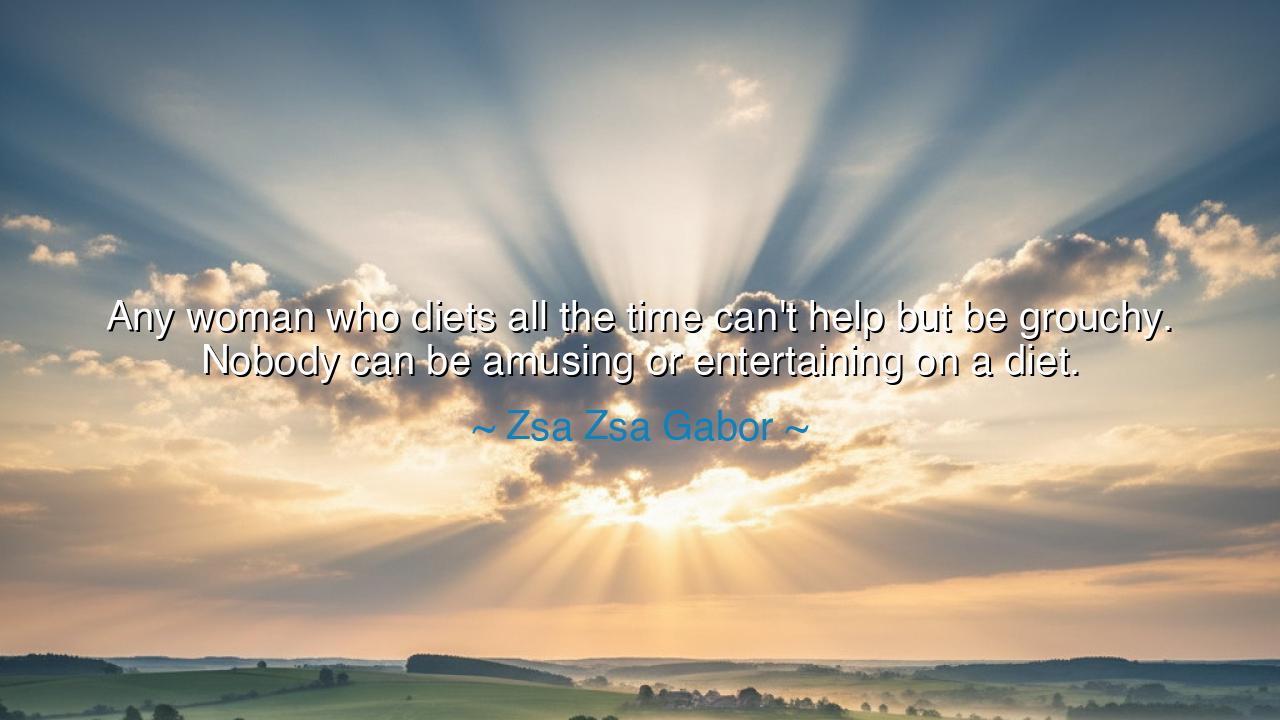
Any woman who diets all the time can't help but be grouchy.
Any woman who diets all the time can't help but be grouchy. Nobody can be amusing or entertaining on a diet.






"Any woman who diets all the time can't help but be grouchy. Nobody can be amusing or entertaining on a diet." These words, spoken by the legendary Zsa Zsa Gabor, strike at the heart of a truth that transcends the individual and speaks to the very essence of human nature. There is a wisdom here, one that understands the human spirit and the delicate balance between the demands of the body and the needs of the soul. Gabor, in her playful but poignant remark, reveals an ancient truth: that when one’s mind is consumed by the constant deprivation of dieting, the joy of life itself becomes stifled.
To live in such a state of restriction, where every meal is weighed and measured, where indulgence is seen as a sin, is to live in a prison of the mind. In ancient times, the philosophers spoke often of the importance of moderation and balance in all things. The great Aristotle taught that the key to a virtuous life lay in the golden mean—a balance between excess and deficiency. To live a life of self-denial without purpose is to lose the vitality that makes life worth living. Gabor’s words are a modern echo of this age-old wisdom, reminding us that joy, laughter, and entertainment come from a spirit of freedom, not from the chains of constant restriction.
Consider the ancient Romans, who reveled in the pleasures of life, enjoying grand feasts and celebrating their victories with abundant food and wine. Their indulgences were not seen as weakness, but as a reflection of their belief in living life fully. They understood that happiness is often born of a balance between enjoyment and discipline. They did not view food merely as fuel for the body, but as part of the grander celebration of life. A life spent in the constant pursuit of self-restraint, devoid of pleasure, is a life half-lived. Gabor’s words resonate with this ancient ideal: that life is not to be endured, but enjoyed, and that self-imposed suffering should not be the path to fulfillment.
In contrast, there is the story of Socrates, who, while he did not indulge in the same excesses as the Romans, often emphasized the importance of balance in life. He spoke of the soul’s need for nourishment, not just through food, but through intellectual engagement and emotional satisfaction. In this way, Socrates understood that the body and the spirit must be nourished equally. A person who sacrifices one in the name of the other—be it through excessive indulgence or unyielding dietary restraint—creates an imbalance that can lead to bitterness, as Gabor so rightly points out. The grouchiness that arises from constant dieting is not just the result of hunger, but of a deeper spiritual deprivation, a soul that is constantly denied its fullness.
Gabor’s reflection also speaks to the very nature of joy. To be “amusing” or “entertaining” requires a free spirit, one unburdened by the relentless focus on the body’s needs and desires. When the mind is consumed by thoughts of food, by calories, and by self-imposed limitations, there is little room for the lightness of being that is necessary for laughter and play. This is a truth known to many great artists and performers, such as Shakespeare, who understood that creativity and joy are born from a place of freedom, not from the chains of deprivation. In the same way, Gabor suggests, we cannot truly express our full selves when we are constantly weighed down by the pursuit of an idealized, often unattainable, version of ourselves.
The lesson here is one of balance—a call to embrace both the nourishment of the body and the liberation of the soul. Life is meant to be experienced in its fullest expression, and that includes both the pleasures of food and the joys of laughter and creativity. To constantly live in a state of deprivation—whether through dieting or any other form of self-denial—is to deprive oneself of the very essence of life. Gabor’s words serve as a reminder that happiness is found not in restriction, but in the freedom to enjoy life’s pleasures without guilt or shame.
So, what must we do with this wisdom? The lesson is clear: we must not live in fear of indulgence, but seek a life that embraces both self-discipline and self-compassion. We must learn to listen to our bodies, to feed them what they need to thrive, while also nurturing our spirits with laughter, joy, and creativity. Let us follow Gabor’s advice and release ourselves from the constant cycle of deprivation, allowing the fullness of life to enter. For when we live freely, we live fully, and it is in that fullness that we become our most entertaining, joyful, and vibrant selves.






AAdministratorAdministrator
Welcome, honored guests. Please leave a comment, we will respond soon